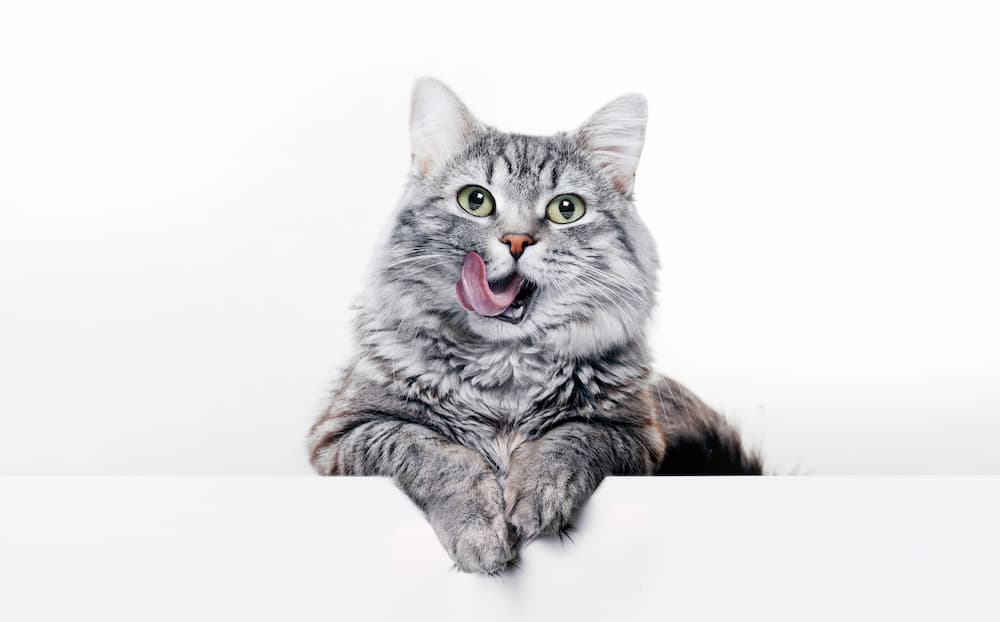Coughing in cats is a symptom that often concerns pet owners as it can indicate various underlying health issues. While it’s less common than in dogs, understanding the reasons behind a cat cough and recognizing when it’s time to seek veterinary care are crucial for maintaining your feline’s health.
What Causes Coughing in Cats?
Coughing in cats can arise from various conditions, ranging from mild irritations to serious health concerns. Here’s a detailed look at the common causes:
- Respiratory Infections: Respiratory infections frequently cause coughing in cats and can be viral, bacterial, or fungal. These infections irritate the respiratory tract, leading to coughing, which helps clear mucus and pathogens. Infections like feline calicivirus or herpesvirus can particularly affect the upper respiratory tract, while others may impact lower areas, causing deeper, more severe coughs.
- Asthma: Feline asthma is a chronic inflammatory disease of the airways, causing spasms that result in coughing and difficulty breathing. It’s often triggered by allergens in the environment, making it a common yet serious concern for indoor cats. Asthma attacks can vary in severity and frequency, and in some cases, may be linked to seasonal changes that increase the presence of airborne allergens and potential allergies in cats.
- Pleural Effusion: This condition involves fluid accumulation in the space around the lungs, making it difficult for cats to breathe and often leading to a cough. Heart failure, infections, or tumors can cause it. The fluid buildup reduces lung capacity, forcing the cat to cough to increase air intake and relieve discomfort.
- Inhaled Foreign Objects: Cats are curious creatures, and they can inhale small objects that get stuck in their throat or airways, leading to a persistent cough as the body tries to expel the irritant. This is especially common in outdoor or active cats who might encounter small particulates like seeds, tiny toys, or bits of food that can accidentally be inhaled.
- Cancer: Although less common, some types of cancer can affect the lungs or airways, leading to a persistent cough. Lung tumors can cause a chronic, progressive cough that may be mistaken for other conditions initially. These cancers can also lead to secondary symptoms like lethargy, weight loss, or difficulty breathing, compounding the urgency for veterinary evaluation.
- Trauma: Trauma to the throat or chest area can lead to coughing as part of the body’s response to injury. This might include anything from a hit to a fall. Such incidents can cause swelling or bruising of the respiratory tract, which irritates the area and triggers a cough reflex.
- Heartworms: Heartworm disease is not as common in cats as in dogs, but it can still cause coughing. The worms live in the heart and major blood vessels, damaging the cardiovascular system and lungs. Cats may show signs of respiratory distress, including occasional coughing and rapid breathing, often mistaken for asthma or other respiratory conditions.
Wet Cough vs. Dry Cough in Cats
Distinguishing between a wet cough and a dry cough in cats is crucial for diagnosing the underlying issue effectively.
- Wet Cough: A wet cough in cats is characterized by a deep, gurgling sound that suggests the accumulation of fluid or mucus in the cat’s airways or lungs. This type of cough is commonly associated with respiratory infections where the body produces excess mucus in response to the infection. Conditions like pleural effusion, where fluid accumulates around the lungs, can also lead to a wet, productive cough. In such cases, the cough may be accompanied by other symptoms like labored breathing or a decreased activity level, indicating the seriousness of fluid buildup.
- Dry Cough: Contrastingly, a dry cough typically sounds more hollow and can be repetitive and harsh. This type of cough is often associated with irritative or inflammatory conditions within the respiratory tract. Asthma is a common cause of dry cough in cats, where inflamed airways lead to spasmodic coughing fits without much mucus production. Similarly, inhaling foreign objects like dust, small toys, or other irritants can trigger a dry cough as the cat’s body attempts to expel these items from the airway.
Both types of coughs warrant a visit to the vet, as they signal discomfort or distress within the respiratory system that requires attention. Continuous monitoring of the type of cough and other symptoms can provide vital clues to the veterinarian during diagnosis and help tailor the most effective treatment plan for the cat’s recovery.
Can Cats Get Kennel Cough From Dogs?
Kennel cough is predominantly a canine ailment, but it can affect cats (though it is not common). The primary agent responsible for cross-species transmission is the bacterium Bordetella bronchiseptica. This pathogen can spread in environments where dogs and cats are housed together, such as kennels or multi-pet households.
While the symptoms of kennel cough in cats are generally milder than in dogs, they are important to recognize for timely intervention. If you suspect your cat might have contracted kennel cough from a dog, look for the following signs:
- Persistent Coughing: Similar to the cough seen in dogs, affected cats will exhibit a strong, persistent cough that can sound like a “honk.” This is due to irritation and inflammation in the trachea and upper airways.
- Sneezing and Runny Nose: Cats may also show signs of upper respiratory tract infections, such as sneezing and nasal discharge, commonly associated with Bordetella bronchiseptica infection in cats.
- Lethargy: As with any respiratory infection, your cat may display a general decrease in activity levels, choosing to rest more than usual due to discomfort and fatigue from the effort of coughing.
- Appetite Loss: Difficulty breathing and constant coughing can lead to decreased appetite, as the effort to eat becomes too taxing or uncomfortable for the cat.
Suppose your cat shows these symptoms and has been in contact with a coughing dog diagnosed with kennel cough or has recently been in a kennel environment. In that case, it’s advisable to consult a veterinarian. Early diagnosis and treatment are crucial to prevent complications and ensure a quick recovery. In most cases, treatment involves antibiotics to clear the infection and supportive care to ease symptoms and support the cat’s immune system.
Cat Coughing With Other Symptoms
When a cat exhibits coughing alongside other symptoms, it can suggest a more complex health issue involving multiple systems or a significant underlying condition. Each combination of symptoms can guide veterinarians toward specific diagnoses and influence the subsequent treatment approach.
Cat Coughing and Sneezing
Concurrent sneezing and coughing are often signs of a respiratory infection, possibly viral or bacterial. This combination suggests that both the upper and lower respiratory tracts are affected. The presence of these symptoms often points to widespread inflammation or infection, such as feline herpesvirus or calicivirus, which require targeted treatments to manage symptoms and underlying causes.
Cat Coughing and Wheezing
Cat coughing and wheezing may indicate asthma or severe allergic reactions, highlighting the need for immediate veterinary attention to manage breathing difficulties. Wheezing, in particular, suggests a constriction or obstruction in the airways, which can be acute and life-threatening if not addressed quickly. Cat asthma can often be managed with medications that reduce inflammation and dilate airways, providing significant relief.
Cat Coughing Up Hairballs
While often normal, frequent cat coughing but no hairball production can indicate that coughing is due to other reasons, such as asthma or infections, rather than just hairball irritation. If your cat is coughing, but no hairball is produced despite the cat’s efforts, it is important to investigate other causes. Chronic coughing without expulsion of hairballs may require diagnostic tests such as chest X-rays or bronchoscopy to determine the exact cause and appropriate treatment.
What is the Treatment for Cat Coughing?
The treatment for cat and kitten coughing depends significantly on the underlying cause. Antibiotics may be used for bacterial infections, while asthma is managed with corticosteroids and bronchodilators. In cases of foreign body inhalation, removal under sedation may be necessary. For chronic conditions like cancer, more intensive therapies such as chemotherapy might be considered.
When Does a Coughing Cat Need Veterinary Attention?
Suppose your cat’s coughing persists for over a few days, becomes severe, or is accompanied by other symptoms like loss of appetite, lethargy, or difficulty breathing. In that case, it’s crucial to seek veterinary care. Chronic coughing can lead to significant health issues if left untreated. So, if you have been wondering, “Why does my cat keep coughing?” or “Is my cat sick?” it may be time to see a vet.
Need Immediate Veterinary Care? Find an UrgentVet Location Near You!
Persistent or severe coughing in cats should not be overlooked. If you’re wondering why my cat keeps coughing, or you notice any concerning symptoms, contact UrgentVet. We offer expert care for all cat dry cough and other respiratory issues, ensuring your cat receives the best possible treatment. With a quick, same-day appointment, you can help your cat breathe easier and feel better today.
Find your nearest UrgentVet location and use our online booking platform to make your appointment today!
Image Credit: KDdesign_photo_video / Shutterstock





